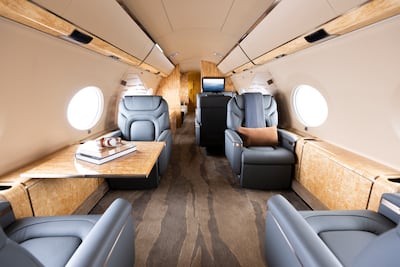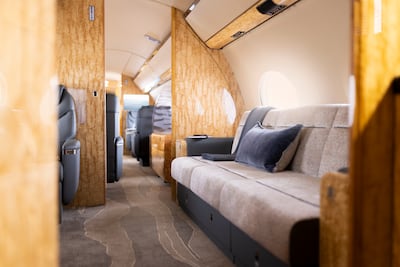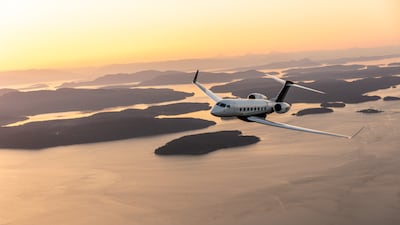In 2019, one year before Covid-19 shuttered the global commercial airline industry, American private jet operator Flexjet announced a $1.2 billion order from aircraft manufacturer Gulfstream, considered the gold standard in long-range private jets. That same year, Flexjet opened its London office in the prestigious Mayfair district in a move to expand further afield into Europe.
Those moves proved pivotal for the Ohio company, founded in 1995 as a shared ownership operator.
"The introduction of Gulfstream into the fleet suddenly changed the nature of the business," says Marine Eugene, Flexjet's managing director for Europe. "They went from being a solid mid-American player based in Ohio to a world-class global player with clients flying to destinations around the world — to Hong Kong, Dubai, India and across Europe.
"So suddenly their eyes were focused externally. If customers were flying to those destinations, that means there is a market there and they needed to start changing and be more international."
Eugene, a private jet industry veteran, also joined Flexjet that same year, tasked with growing its operations in Europe and the Middle East. She was part of an introductory flight into Dubai earlier this month to present the long-range Gulfstream G650 to Middle Eastern customers. The move marks the first time the aircraft has become available in the region through a shared ownership programme.
Enjoying a maximum range of nearly 11,500 kilometres and a top cruise speed of 1,133 kilometres per hour, the Gulfstream G650 allows non-stop flights of up to 14 hours and is suitable for trips between Dubai to New York or Abu Dhabi to London.

Flexjet's Europe, the Middle East and Africa (EMEA) operation will be based in Mayfair supplemented by a Tactical Control Centre at Farnborough Airport, and an Operational Centre in Malta.
Eugene says the company's regional expansion plans are timely as the private jet industry continues its phenomenal post-pandemic boom.
“The Middle East is home to a melting pot of many different nationalities. The UAE in particular has become a magnet for an increasing number of ultra-high-net-worth individuals, businesses and families who want to travel on their own terms,” she says.
“We already fly regularly between the Middle East and Europe or the US and we are now delighted to invite private aviation users based here to fly with us. This is an important growth market for Flexjet and in the past year, we have almost doubled our fleet to service the EMEA region, with more aircraft to be added next year. This will be complemented by additional infrastructure over the coming years."

Once associated with only entertainers and top executives, private jet travel now accounts for a quarter of US flights, roughly twice the pre-pandemic share, according to research and consultancy WINGX. Private aviation traffic is also up about 15 per cent from its 2019 levels in the US, while airline traffic remains down about 13 per cent, according to data from the flight-tracking website FlightAware.
And, consultancy McKinsey & Company estimates that before the pandemic only 10 per cent of those with the means to travel privately did so.
"When you look at what's happening in the commercial airline industry, it is still down 20 per cent on their level of connections and flight offers from what that was before the pandemic," says Eugene. "So what you saw during the pandemic was a new demographic of customers who had the means to fly private, but they had never really done it. And during the pandemic, there was a justification to discover it.
"Then, once you've experienced it, it's very addictive. You choose when you take off, you choose where you land. It's very private, very exclusive. So it's an incredibly powerful experience.
"We don't think the customers that joined us during the pandemic are going to ever return to commercial aviation. So our industry is really going through phenomenal growth at the moment worldwide."
Flexjet was acquired in 2013 by Directional Aviation, led by aviation entrepreneur Kenn Ricci, which has a portfolio of private jet services operators including Sentient Jet, Private Fly International and FXAIR. Last month, it announced its plans to go public next year after it struck a deal, valued at $3.1 billion.

With a fleet of more than 250 aircraft and helicopters, the company's business model includes shared ownership, a flexible leasing programme and a jet card programme, which offers minimal upfront investment for those with lighter travel schedules.
It's designed to make the whole decision process of joining a private aviation club a lot easier, explains Eugene.
"Before, the hurdles to get into the private aviation club were huge. Not only was there a very high price, but waiting lists, a long purchasing process, lengthy contracts and lawyers involved. And once you had your aircraft, if you realised it was not good enough for you, because it was just too big, or you needed to do something else with it, you didn't have any way to dispose of it," she says.
"When you start flying a lot and you want to acquire a private jet, you'd probably look at say, a Gulfstream G700. That would cost you probably about $75 million and it will take you about three years before it's delivered.
"So what we do is break it in a way that's much more accessible for our customers. You're now looking at a $49 million aircraft that's already been refurbished entirely and you can join the programme by buying only one-eighth of it, about 12 per cent. So you buy for $6 million instead and we guarantee to buy back when you're done with it after three or five or 10 years when you don't want the asset anymore. You don't have to worry about who's gonna take it back from you."
While still a very exclusive club, Flexjet's model makes private jet ownership more accessible, says Eugene.
"The entry level is about $6 million. And you're going to spend about $2 million a year on everything. So it's still not something everyone can do. But it just makes the purchasing decision a lot easier.
"You know the survey in our business that says that only 10 per cent of the people in the world who have the means actually fly private. That means 90 per cent of our possible audience doesn't because it's too complicated. They don't know how to do it. They don't want to hire and they don't want to be involved in buying an asset and managing it because there are a lot of complications in our industry. So we kind of take away the blockage to entry.
"And we feed the industry because people start with us, and then maybe after that they feel ready to buy an aircraft."

